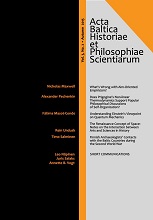Finnish Archaeologists’ Contacts with the Baltic Countries during the Second World War
Finnish Archaeologists’ Contacts with the Baltic Countries during the Second World War
Author(s): Timo SalminenSubject(s): Archaeology, WW II and following years (1940 - 1949)
Published by: Tallinna Tehnikaülikooli õiguse instituut
Keywords: archaeologists and society; Baltic Sea region; history of archaeology; scholarly networks; Second World War;
Summary/Abstract: Finnish archaeologists, especially Aarne Michaël Tallgren, had established contacts with their colleagues in the Baltic countries before the Second World War. In the summer of 1939, the world situation became a dominant theme in letters between archaeologists. The outbreak of war in Europe and the military base negotiations in Moscow evoked increasing concern. After the Soviet attack on Finland, only a few Finnish and Baltic archaeologists stayed in contact, but communications revived quickly after the Finnish-Soviet peace treaty of 1940. Estonian archaeologist Harri Moora saw the trials of war as a punishment for forgetting all spiritual values in previous years. The Soviet occupation of the Baltic countries in 1940 broke all contacts for longer than a year. After Germany had occupied the Baltic countries in 1941 and was allied with Finland in war against the Soviet Union, connections could be resumed to some extent. Tallgren, together with the Swedish State Antiquarian Sigurd Curman, now started planning the evacuation of children from Estonia to Sweden. In 1942, scholarly discussion returned to the correspondence, although only on a practical level, but already in early 1943 all correspondence became impossible. At the same time, Finnish archaeologists were in contact with Baltic refugees, especially Francis Balodis from Latvia. There were also Scandinavian and British archaeologists with whom Finnish researchers exchanged information about colleagues in the Baltic countries. The communications mainly focused on three things: getting and spreading information regarding the current situation, offering both practical help and psychological support to colleagues in the Baltic countries, and attempting to re-establish the exchange of ideas within the scholarly community.
Journal: Acta Baltica Historiae et Philosophiae Scientiarum
- Issue Year: 3/2015
- Issue No: 2
- Page Range: 82-107
- Page Count: 26
- Language: English

